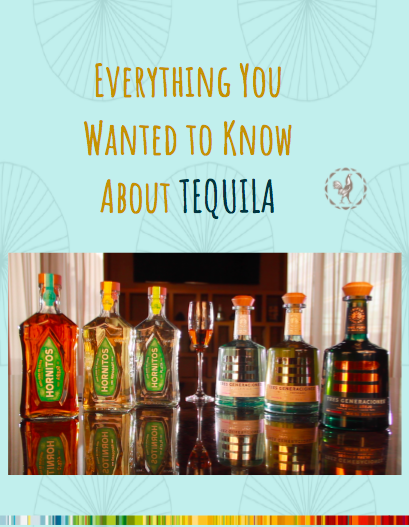
In a previous blog, we talked bout the designation of origin, the ABV that a tequila must have and production processes.
This time we'll talk about:
- The different categories and types of tequilas that exist
- If the resting processes keep happening in the bottle
- The different kinds of glasses to drink tequila from
We hope this blog post helps answer those questions that you may have about tequila. Here we go!
Categories and Kinds
Categories
Based on the sugars used in its production, tequila is divided into two CATEGORIES:
- 100% Tequila. Made only with sugars that come from Tequilana Weber Agave, Blue Variety.
- Tequila. Made with at least 51% of Tequilana Weber Agave, Blue Variety sugars. The rest of the sugars come from different sources, such as sugar cane, corn syrup, and fruits.
Kinds
Based on the time it spends— or doesn't spend —resting in wooden barrels (whether it's 100% tequila or a blend of tequila), this drink is divided into five kinds. Why? What makes the difference is the time the tequila spends in a barrel, in contact with the wood. It's the wood of the barrel that adds color, aroma, and taste to the product.
These 5 KINDS of tequilas are:
- White or silver. It never makes contact with wood; that's why it is crystalline, transparent, and colorless.
- Young or Gold. It's a white tequila to which coloring is added (any of those allowed by the Tequila Regulatory Council, for example, caramel color, wood extract, glycerin). Its characteristics are obtained by this coloring, not by being in a wooden barrel.
- Rested
- Aged
- Ultra aged
The last three are those that derive their characteristics from the wood, and the difference between these three lies in the resting time and characteristics of the wood.
How do I know if it's a rested tequila or if it's got its golden color with a coloring?
If a buyer wants to know whether the tequila bottle he's buying achieved its golden color through coloring or by being in contact with wood, all he has to do is read the label. It must be labeled as "rested, aged, or ultra-aged" (reposado, añejo, and extra-añejo, in Spanish). If you can't find any of these on the label, it means that an additive or coloring has been added to this product (which is fine, as the Tequila Regulatory Council approves them).
Is age better than white?
Not necessarily. A rested tequila was once a white tequila. The quality remains the same; what changes is the notes it acquires thanks to the time it spends in contact with the wood of the barrels.
For many people, due to their palate, it gives them the feeling that the rested or vintage tequila is a softer product because it doesn't feel as "burning" in the throat as a white tequila does, but this is because of the traits and notes that the wood gave the tequila, not because it's of better or worse quality. In the rested or vintage tequilas, the alcohol that initially started as a white tequila is "disguised" by the notes of vanilla and roasted seeds that the wood imparts to it. All the flavors that the wood has add notes to the liquid, disguising the alcohol. That's why it feels softer to the palate, and perhaps we confuse this with being of a higher quality, but that's not true; they can both be of excellent quality.
Now, it depends on the palate of each person to choose which tequila to drink.
- There are people with strong palates who enjoy intense flavors, such as spices and garlic. These individuals typically prefer white tequilas.
- There are people with sweeter palates who prefer sweeter foods. These people usually like rested or aged tequilas.
100% Tequila and Tequila ... When to buy one or the other?
Both are good, and the decision depends on each person's palate. The 100% tequilas have more agave notes, and the Tequila is slightly sweeter due to the added sugars. In the end, it depends on the consumer's palate, the one they like the most, the one they like the best.
Tequilas are widely used for mixology, as they tend to be the economic lines of the tequila industry. So, if you are going to make a mixed cocktail, it is better to use tequilas, preferably ones that have not rested. Many people say, "I'm going to buy a rested tequila to make some margaritas." You can, of course! But honestly, I think it would be disrespectful to a tequila that's been waiting for so long, for so many years, to be tasted. Aged tequilas have gone through a period of resting and therefore deserve respect. The best way to enjoy them is straight, at their purest, to savor their taste.
In terms of cocktails, my recommendation would be to use white tequilas, which are more affordable and, ultimately, will yield the desired result in a cocktail: fresh notes from the product. That's why a white tequila is key for mixology. It can be a white 100% tequila or tequila.
How can I determine if the tequila I'm buying is 100% pure tequila?
A consumer can identify if he's buying a 100% pure agave tequila by reading the label, which should say any of the following:
- 100% pure agave
- 100% blue agave
- 100% agave
Does my tequila expire? Does its taste change over time?
Once this product is poured into a stainless steel or glass bottle, it should no longer undergo any changes; that is, it shouldn't undergo any further aging or fermentation process.
A tequila doesn't expire. It can last for years. What may happen is that, after spending many years in a cellar or home bar, the seal on the bottle may expire. If the seal expires, the product will evaporate. If that's the case, then yes, there will be a change in the product's characteristics. But it'll be because the alcohol, followed by the rest of the liquid, will evaporate. Due to this evaporation, the product's characteristics will change.
As long as you don't break the seal or open your tequila bottle, it can last for many years. The time will come when the seal, by its very nature, will expire, changing the characteristics of the product, but tequila itself doesn't have an expiration date.
Tequila should be served in a shot, right?
Yes, but not only as a shot. Here's where we can see the versatility of the drink. We can use the glass to make any drink we want!
If you want to drink it straight, the most common version is indeed the shot, but it can also be served in:
- Riedel Glass. It's the official glass for tequila tasting. To identify the organoleptic notes of the product, you must do so in this glass. Just as champagne and cognac have their own glasses, tequila also has its own glass to taste the product, and it's this one.
- Martini glass. For the classic margarita
- Old-fashioned glass. For a tequila on the rocks (aged tequila)
The truth is that this versatile tequila makes our drink a very unique drink in the world. And if you don't want to use a glass ... straight from the bottle it is!
Follow our blog posts so you don't miss the last blog post of this series and learn more about our traditional Mexican drink. Cheers!
.png?width=50&height=50&name=10.CS-Redondo%20(1).png)
 Rafael Ramos
Rafael Ramos